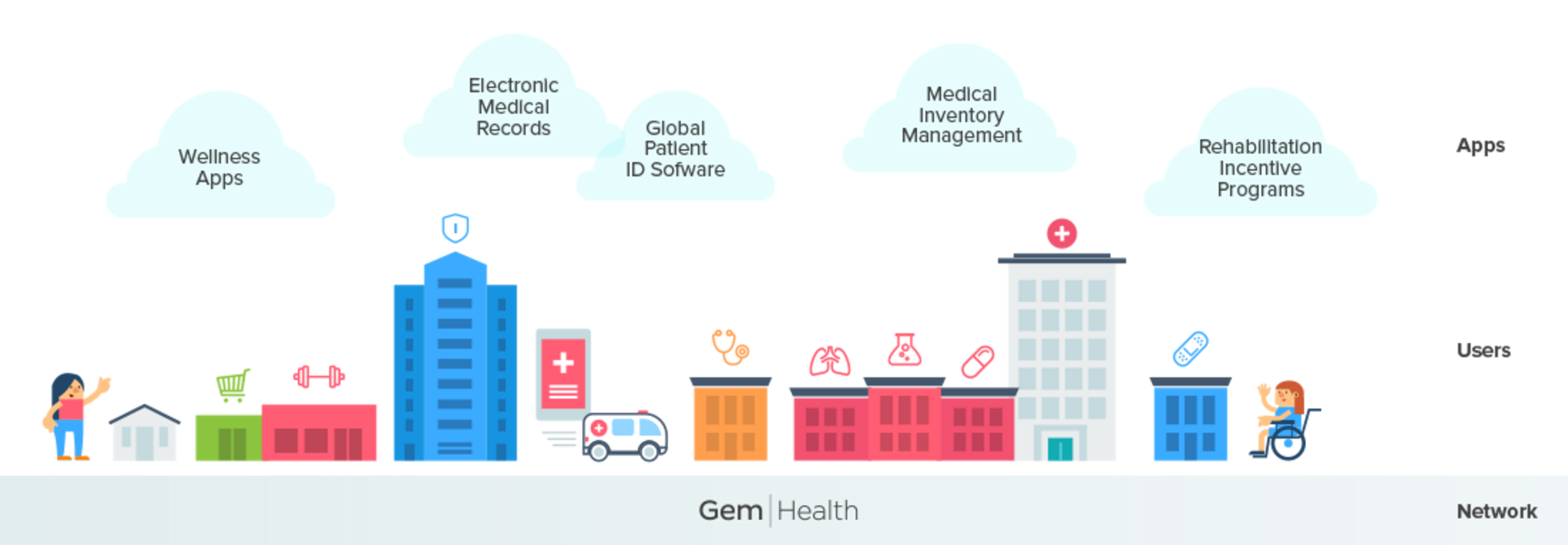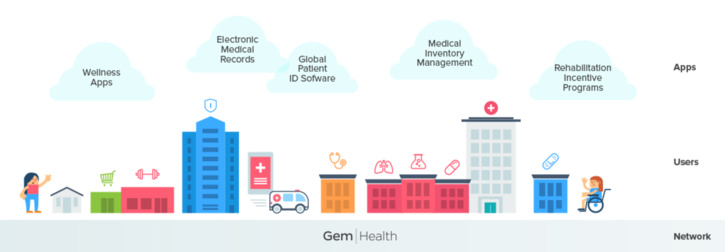Healthcare is one of society’s great responsibilities. It represents a significant portion of the global economy. It secures and mobilizes vasts amounts of critical data. It touches every single life on this planet.
This massive ecosystem of service providers, insurers, regulators, patients and technologies is expensive to maintain, and as the need for connected services increases, so does the risk exposure for every participant. Companies are charged with securing millions of identities, years of private medical data, and even the very technology that helps our hearts beat. While years of investment into technical infrastructure have produced an ecosystem unlike any in human history, it’s outdated and there are limits to what it can do. These limitations are costing the industry billions of dollars.
We need a modern infrastructure that unlocks new channels for services to connect, while balancing the need for strong data privacy and security. Blockchain technology is that infrastructure.
This technology allows participants to move data in real-time, without the need for reconciliation, because each participant is connecting to the same network, working on shared information, and collaborating peer-to-peer – all without exposing these channels to theft, forgery and malice. Blockchains are a protocol that produce an irrefutable log of network activity that is both cryptographically secured and relayed across a vast distribution network. Because the integrity of this history can be proved with mathematics, everyone can trust that it is secure and true.
Disconnected parties–within an organization or across an entire industry–can now securely converge on the same information, allowing for the development of an entirely new class of applications that will unlock wasted resources and solve problems in ways we never thought possible.
This massive ecosystem of service providers, insurers, regulators, patients and technologies is expensive to maintain, and as the need for connected services increases, so does the risk exposure for every participant. Companies are charged with securing millions of identities, years of private medical data, and even the very technology that helps our hearts beat. While years of investment into technical infrastructure have produced an ecosystem unlike any in human history, it’s outdated and there are limits to what it can do. These limitations are costing the industry billions of dollars.
We need a modern infrastructure that unlocks new channels for services to connect, while balancing the need for strong data privacy and security. Blockchain technology is that infrastructure.
This technology allows participants to move data in real-time, without the need for reconciliation, because each participant is connecting to the same network, working on shared information, and collaborating peer-to-peer – all without exposing these channels to theft, forgery and malice. Blockchains are a protocol that produce an irrefutable log of network activity that is both cryptographically secured and relayed across a vast distribution network. Because the integrity of this history can be proved with mathematics, everyone can trust that it is secure and true.
Disconnected parties–within an organization or across an entire industry–can now securely converge on the same information, allowing for the development of an entirely new class of applications that will unlock wasted resources and solve problems in ways we never thought possible.
Healthcare is about humanity. For us, it’s personal.
Blockchain technology is often explored in the context of finance, but its scope applies well beyond dollars and cents. At a critical moment in the history of information security, this system has emerged to address the trade-off between data security and data availability. When we imagined the implications of this technology for healthcare, we knew we had to solve this problem.
Healthcare is currently experiencing the strain of digital services that run on top of antiquated, paper-based infrastructure, much like banking and finance. Individuals want more interconnected services and a more personalized health plan, but for providers, this is impossible. The cost of providing personalized care to everyone is too high, and the risk of exposing such an interconnected ecosystem is too great. The result is a fragmented and heavily siloed industry, where having incomplete information is just part of the job.
Blockchains will inevitably create a new fabric that connects the entire healthcare industry, weaving together critical data from every stage of the continuum of care. We believe that blockchain networks are a scalable solution for shared infrastructure that keeps critical patient data in the right hands.
We imagine a future where every patient holds the keys to their healthcare passport, bridging patient care among multiple providers and across borders. We imagine hospitals hiring more doctors and nurses on a budget recovered from wasted reconciliation expenses. We imagine labs, wearables, shopping lists, and healthcare apps working together to inform a healthier population.
We imagine better quality of care for every patient, and easier, smarter systems for the providers that care for them. That’s why we created Gem Health. Together, we will build the fabric of a globally integrated healthcare continuum, designed to make healthcare smart, secure and personal.
gem.co
Blockchain technology is often explored in the context of finance, but its scope applies well beyond dollars and cents. At a critical moment in the history of information security, this system has emerged to address the trade-off between data security and data availability. When we imagined the implications of this technology for healthcare, we knew we had to solve this problem.
Healthcare is currently experiencing the strain of digital services that run on top of antiquated, paper-based infrastructure, much like banking and finance. Individuals want more interconnected services and a more personalized health plan, but for providers, this is impossible. The cost of providing personalized care to everyone is too high, and the risk of exposing such an interconnected ecosystem is too great. The result is a fragmented and heavily siloed industry, where having incomplete information is just part of the job.
Blockchains will inevitably create a new fabric that connects the entire healthcare industry, weaving together critical data from every stage of the continuum of care. We believe that blockchain networks are a scalable solution for shared infrastructure that keeps critical patient data in the right hands.
We imagine a future where every patient holds the keys to their healthcare passport, bridging patient care among multiple providers and across borders. We imagine hospitals hiring more doctors and nurses on a budget recovered from wasted reconciliation expenses. We imagine labs, wearables, shopping lists, and healthcare apps working together to inform a healthier population.
We imagine better quality of care for every patient, and easier, smarter systems for the providers that care for them. That’s why we created Gem Health. Together, we will build the fabric of a globally integrated healthcare continuum, designed to make healthcare smart, secure and personal.
gem.co
Chaineum : ICO, STO & IPO Boutique | Conseil Blockchain
Leloup Partners : Healthcare Investment Banking, Banque d'affaires des HealthTech
Leloup Partners : Healthcare Investment Banking, Banque d'affaires des HealthTech
Autres articles
-
Chainalysis acquiert Hexagate, fournisseur de solutions de sécurité WEB3
-
Ripple a lancé son stablecoin, RLUSD
-
Coinbase & Chainlink, l'union autour du projet Diamond pour renforcer l'interopérabilité entre blockchains
-
Bitstack : 5 millions d'euros levés pour construire la "neobanque Bitcoin"
-
Société Générale : une première opération de REPO sur Blockchain publique avec La Banque de France






